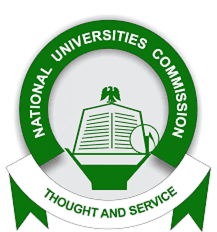The National Universities Commission (NUC) has warned universities to desist from cutting corners during accreditation visitations or risk their programmes’ approval being revoked.
The Acting Executive Secretary of the commission, Mr Chris Maiyaki, gave the warning on Sunday during an interview with the News Agency of Nigeria (NAN) in Abuja.
Maiyaki said institutions and programmes that fall short of the threshold of the minimum academic standards and failed to meet the resource assessment benchmarks would be denied accreditation.
“If a university is approved and the university wants to mount a programme, they will write to the NUC to come and undertake resource assessment which is the beginning.
” We will go with our curriculum which is the minimum standards and we put together a team of subject experts and NUC staff and evaluate the capability statement and we look at the quantity and quality of resources available to the institutions.
“We look at the personnel both in teaching and non-teaching categories, the learning resources available to them, library- both in hard and e-learning configurations.
“Do they have the teaching aids, classrooms, ICT penetration? we check the learning process from the beginning to the end we issue an outcome statement which is very important”, Maiyaki told NAN.
He said the outcome statement forms the basis of what the commission would communication to JAMB, NYSC and TETFund and the public.
“We send to NYSC so that when the students finally are to graduate, there will be nothing like whether they are illegal or not then we give a symbol of authority and that is the major quality assurance measure to be or not to be.
“When we find you falling short of threshold, you cannot proceed; when the approval matures we then undertake accreditation and accreditation is the major function and core mandate of the NUC,” he told NAN.
He said right quality, fulfilment of the mandate of the philosophy of course content, among other conditions being met before d a definite statement for accreditation would issued.
“After we issue the definite statement for accreditation and you are found to be consistent with non performance, we will give you denied accreditation.
“If you are short of certain threshold we give you interim accreditation. But, if we are to enable you to remedy the deficiencies and we return after two years and you have interim accreditation again back-to back-then you are considered to be denied accreditation.
“But if you have full accreditation then you continue with the programme”, he said.
In said in the past the commission had suspended licences, operations of some private universities and even stopped some federal universities` programmes to enable them go back to the drawing board to right their wrongs.
“We came into being in 1962 as a small administrative and advisory unit in the cabinet office of the Prime Minister. At that time, there were just probably five universities.
“And between the advent of the university of Ibadan in 1958 till date, we have 270 universities; 61 federal public universities funded, 63 State owned public funded, and 146 universities are private.
“Like I said, the rest is history now. Two of these evolution of what we now have as contemporary Nigerian University System (NUS), the NUC has paid a very pivotal role in the evolution, in the emergence of the system.
“How do we go about it? what is our business with the university evolution?, we are empowered by the laws of the NUC to lay down minimum academic standards.
“We are the regulatory, coordinating and quality assurance agency for university education,” he said.
NAN












